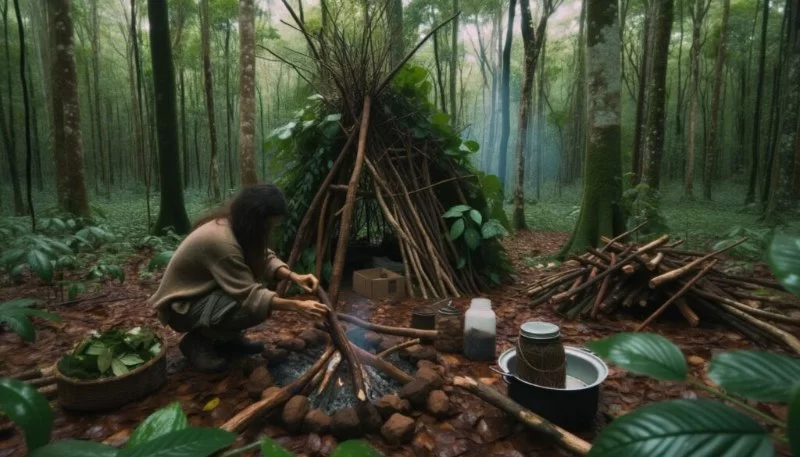Explore the core principles of primitive survival skills—from shelter and fire to food and water. Discover real-life stories, practical tips, and where to start your own journey into wilderness self-reliance with Pine Cliff Resort.

- understanding-the-principles-of-primitive-survival-skills
- the-core-pillars-of-primitive-survival
- real-life-experiences-in-wilderness-survival
- the-value-of-learning-primitive-skills-today
- where-to-start-your-survival-skill-journey
1. Understanding the Principles of Primitive Survival Skills
In a world dominated by technology and convenience, there’s something deeply grounding about learning primitive survival skills. These are the techniques our ancestors relied on to live—without electricity, without supermarkets, and without cellphones. Understanding these principles goes beyond entertainment; it connects us with nature, teaches self-reliance, and prepares us for unexpected situations in the wild.
The idea of survival isn't just about escaping a disaster—it's also about reconnecting with basic human instincts and the environment. And whether you’re a weekend adventurer, a homesteader, or simply someone curious about traditional living methods, mastering these skills can be transformative.
2. The Core Pillars of Primitive Survival
2.1 Shelter: The First Defense Against Nature
Shelter is a top priority in survival. Exposure to the elements—whether freezing wind or scorching sun—can quickly become deadly. Primitive shelters like debris huts, lean-tos, or even snow caves are lifesaving constructions that require no modern tools.
Understanding how to work with your surroundings—using branches, leaves, and even mud—can mean the difference between warmth and hypothermia. Building one with your own hands brings a powerful sense of accomplishment, especially when you feel the warmth inside on a cold night.
2.2 Fire: Heat, Light, and Hope
Fire has long symbolized survival and life. Making fire without matches—by using bow drills, hand drills, or flint and steel—requires skill and patience. But once mastered, it empowers you to cook, signal for help, and stay warm.
Interestingly, many survivalists say fire is also a psychological anchor. In dark, stressful wilderness situations, a flickering flame can calm nerves and bring a sense of safety.
2.3 Water: Finding, Purifying, and Conserving
The human body can’t last more than three days without water. Knowing where to find water—like from creeks, plant transpiration, or condensation traps—is only half the battle. Equally crucial is learning how to purify it, whether by boiling, filtering with charcoal, or using UV light from the sun.
In wilderness survival, every drop matters. Primitive survival training teaches how to respect and conserve water like the precious resource it is.
2.4 Food: Foraging, Trapping, and Primitive Cooking
Food may not be an immediate need in the first few days, but eventually, your body will crave energy. Wild edibles, fish, insects, and small game are all part of the primitive diet. Knowing what’s safe to eat—like acorns, cattails, and pine bark—can be lifesaving.
A visitor to Pine Cliff Resort recently shared their foraging adventure in the nearby woods, discovering wild berries and mushrooms after taking part in a guided survival tour. It’s a perfect example of how practical knowledge meets unforgettable experience in a setting that supports primitive skill exploration.
3. Real-Life Experiences in Wilderness Survival
3.1 A Weekend Gone Wild: Alex's Solo Challenge
Take the story of Alex Morris, an amateur outdoorsman from Montana. He challenged himself to live three days alone with no gear—just what nature could provide. The biggest struggle? Fire. It rained the first night, soaking his supplies. It wasn’t until day two, after hours with a bow drill, that he created a spark and a fire that changed everything.
“I felt like I unlocked an ancient secret,” Alex later wrote. “Fire changed my attitude, gave me confidence, and helped me get through that final cold night.” His story underlines how these ancient skills can still transform modern lives.
3.2 Group Courses that Build Confidence
Survival schools across the U.S. now offer primitive skill camps. These programs combine group support with serious training in a safe, guided environment. They’re especially helpful for beginners and families looking to reconnect with each other—and with the land.
Locations like Pine Cliff Resort often offer seasonal wilderness courses where you can safely learn skills like friction fire-starting or natural shelter building. It’s a unique blend of outdoor recreation and ancient wisdom.
4. The Value of Learning Primitive Skills Today
4.1 Building Self-Reliance in a Digital Age
In a society dependent on technology, understanding primitive survival skills is like having a backup plan for life. It's not about rejecting modernity; it's about complementing it with resilience. You learn how to adapt, think critically, and respond calmly to challenges.
4.2 A Therapeutic Connection With Nature
Time spent practicing primitive skills has mental health benefits too. The repetitive motion of carving, the quiet of tracking animals, or the stillness while watching coals grow—these moments encourage mindfulness and reduce anxiety. It’s no surprise many people use nature immersion as a form of therapy.
4.3 Teaching the Next Generation
Passing down knowledge of fire, tracking, or shelter isn’t just educational—it’s legacy. Teaching kids how to engage with nature respectfully equips them with confidence, curiosity, and environmental awareness. And at places like Pine Cliff Resort, families can enjoy learning these skills together in a scenic and supportive environment.
5. Where to Start Your Survival Skill Journey
5.1 Start Small: Backyard Practice
Before venturing into the woods, start at home. Build a small lean-to in the backyard, try making fire without matches, or identify native edible plants. These controlled experiments help you build competence without risk.
5.2 Learn from the Experts
Books, online tutorials, and hands-on workshops are invaluable. But nothing compares to learning from experienced survivalists face-to-face. Many choose vacation destinations that combine relaxation and learning—like weekends at Pine Cliff Resort—where professional guides can help you sharpen your skills while enjoying nature.
5.3 Always Respect the Land
Survival is not about dominating the wild—it’s about learning to live in harmony with it. Take only what you need, leave no trace, and always prioritize sustainability. The principles of primitive survival aren’t just techniques—they’re a mindset of respect, humility, and resourcefulness.
South Fork Campground
Weston, OR 97886, USA
Visit Location PageDevil’s Island
VQC6+GX, Canyon Lake, TX 78133, USA
Visit Location Page